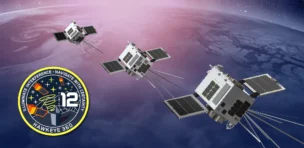Aerospace prime Lockheed Martin will acquire Terran Orbital, a small satellite manufacturer that struggled as a public company, the companies announced yesterday.
The purchaser isn’t a huge surprise: Lockheed already owns a third of Terran, will provide 91% of its future revenue, and even offered to buy the firm earlier this year.
A transaction became inevitable on Monday when Terran reported substantial doubt about its ability to remain afloat without new investment or a sale. Notably, the company removed $2.4B in contract backlog previously attributed to a troubled deal with Rivada Space.
On July 24, Terran had just $14.5M in cash on its balance sheet after losing $25M in the previous quarter, alongside more than $190M in debt. The company needs to maintain $20M on hand to comply with the terms of its borrowing.
CEO Marc Bell wouldn’t comment on the acquisition, but when asked if he would remain as CEO, said, “I have no intentions of going anywhere.” Lockheed said the company will operate as a subsidiary and continue selling spacecraft to the industry at large.
Cry me a Rivada: Terran has received just $13.2M from its partnership with the German satellite operator, versus more than $180M initially expected.
Rivada claims to have $10B in customer commitments for a 600-satellite network, and has been planning to launch spacecraft next year to comply with a 2026 regulatory deadline. Bell said the project is approaching the preliminary design review phase.
“We are carrying on with Terran as our supplier and we don’t expect the acquisition to affect our contract with them or our timelines,” a Rivada spokesperson told Payload.
Timing is everything: Lockheed will pay $0.25 per share for the company’s stock, about $50M, and assume its debt—a far cry from the $1 per share offer it made just four months ago, which Lockheed pulled after Terran’s board didn’t respond in a timely fashion.
The acquisition values the company at $450M, compared to the $1.8B valuation it boasted when it went public through a SPAC transaction in 2021. Lockheed invested $100M in Terran in 2022, and the company is building buses for more than 70 spacecraft the major prime is designing to fulfill contracts with the Space Development Agency.
Terran’s management has been criticized, including from within—in October, three of the co-founders of Tyvak, Terran’s predecessor company, signed onto a shareholder letter that criticized CEO and Chair Marc Bell’s leadership of the company.
“Terran Orbital tripped itself up by not being a good allocator of capital,” B. Riley analyst Mike Crawford told Payload. “There is high demand for emerging satellite manufacturers, especially those demonstrating a niche capability.”




